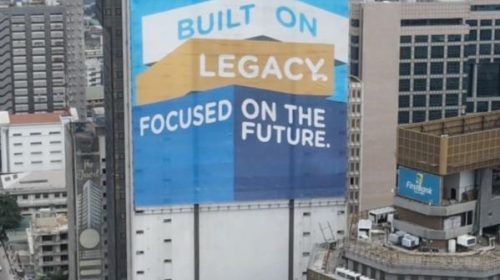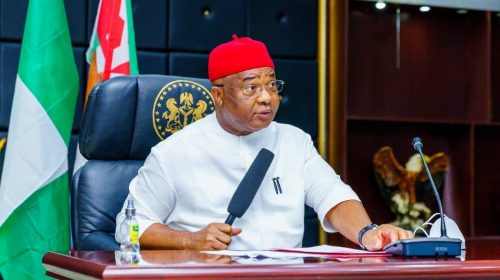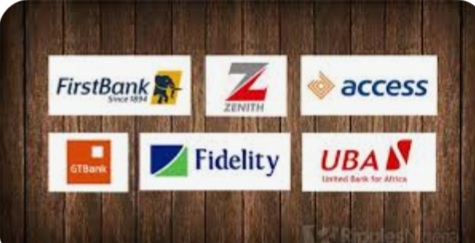NAICOM Moves To Address Oil And Gas Sector’s Needs

By Ngozi Onyeakusi—The National Insurance Commission (NAICOM) said it is intensifying efforts aimed at addressing Oil and gas sector’s needs.
The Commissioner for Insurance Sunday Thomas, said this, in a keynote address presented at the Oriental News 2023 Summit in Lagos.
Read His Full Text Of Speech
Protocol!
It gives me great pleasure to address stakeholders in the Oil and Gas as well as the Insurance sector on the theme very crucial to not just the two industries but the nation as a whole.
The drive towards enhancing local content speaks to the long-term plan of the Government burn out of good intention and strategy to grow our economy, develop the Nigerian Industries and her human capital.
It is worthy to note that prior to the Nigeria Oil and Gas Industry Content Development Act of 2010 (NOGICD ACT), the Insurance Act 2003 made far reaching provisions for the domestication and domiciliation of insurance services in Nigeria. In particular Section 65(7) made it compulsory for any property located in Nigeria whether moveable or immovable to be insured with a Nigerian registered insurer. Section 67 requires that insurance of all imports into Nigeria must be insured by insurers registered in Nigeria.
The Historical relationship between both Industries could be traced to the birth of the latter, following the issuance of the NOGICD ACT, the Insurance Industry in collaboration with the Board brainstormed leading to issuance of The Guidelines for Oil & Gas Insurance Business issued in 2010 which amongst others, stipulates the roles and responsibilities of insurance institutions in ensuring compliance with local content law, with the primary consideration of ensuring actual exhaustion of available In-Country Insurance Capacity.
The overall aim being development of indigenous content through increased indigenous participation.
It is succinct to re-hash that from the German exploration for Bitumen, to the Shell D’Arcy Oil Exploration in Nigeria; from the 1958 Oil Field discovery to the classification of Nigeria as an Oil Producing nation; From the ancient environs of Oloibiri to the ongoing transition to Renewable and Clean Energy; Oil and Gas had been a major discovery for our nation’s strength.
Nigeria holds the largest natural gas reserves on the continent and, according to BP’s estimates in its June 2022 Statistical Review of World Energy, it was ranked sixth globally among exporters of liquefied natural gas (LNG) in 2021.
The economy had over decades enjoyed boost from the Oil and Gas Industry as a catalyst and major contributor to her GDP; This is however not without appreciating the diversification of the economy incepted by the last Federal Government Administration. This significant milestone was not only limited to exploration and production but also the extensive contribution of all other ancillary services; of which Insurance should not be sidelined.
The synergy between both industries was renewed when both agencies identified the need for a veritable platform for inter-agency collaboration in order to give effect to the requirements of Sections 49 and 50 of the NOGICD Act 2010 by providing guidance to Operators in the Oil and Gas necessary for satisfying the provisions of the law in relation to insurance transactions.
The journey for the renewed collaboration transited to the signing and unveiling of the Guidelines on submission of Insurance Programme by Operators, Project Promoters, Alliance Partners, and Nigerian Indigenous Companies in the Nigerian Oil and Gas Industry. Other than the circulation of the Guidelines, there was an official unveiling at the 21st NOG Energy Conference and Exhibition of 4th to 7th July 2022 at the International Conference Center Abuja.
The Jointly issued Guidelines portend to satisfy the intent and provision of the laws: thereby enabling the NCDMB monitor utilization of in-country insurance capacity which is a road to increased retention, growth in in-country technical capacity, Job creation, increased penetration and GDP growth, human capacity development, and many others.
It is also projected that the Guidelines will entrench effective regulatory oversight. This is to be the dividend of an active approach to Joint Regulatory Framework for driving Local Content in Nigeria.
I am honoured to at this juncture put in context the Benefits of the Guidelines to our Industries and the Nation in general;
- The intention is more tilted towards encouraging preventive, detective; as well as corrective and compensatory regulatory controls.
- It is beneficial, to also state, that necessity is on us to ensure that risks are accurately priced and professional advice is given to Insuring entities, especially in the Oil and Gas space, as it poses vantage position to avoiding overpricing of products, underrating of risks, negligent omission of necessary covers and its consequential effect on avoidable pressure and burden on finances.
- The Company’s exposures where not accurately reviewed could deter incentivization from the regulator that could be provided in future to compensate for risk improvements deployed to reduce potential environmental liabilities, or the advantages enjoyable by deploying capital on transition from high based carbon energy and its environmental impacts. This is in contemplation with the pressure to reduce Green-House Gas (GHG) emission and transition to Clean and Renewable Energy.
- A platform that aid juxtaposition of Company’s operations with the obtained Insurance coverages would enhance the pace of the Regulators’ oversight on the appropriateness of products offering to the Market. Proper profiling of the entities’ coverages will compel joint collaboration and facilitation of knowledge sharing in ways optimally beneficial to both Industries.
- The Disclosure and Reporting requirement of Section 49 of the NOGICD ACT is to ultimately enhance regulatory decisions that will benefit the Oil and Gas Industry and the Nation at large.
- Another merit of the collaboration as highlighted in the blueprint between the Board and the Commission is to bridge the identified knowledge gap in the demand and supply sides of the oil and gas insurance value chain. This would not have been possible where there is no special vehicle of research and development which engine is the access to information and data from both the suppliers and consumers.
The Commission has shown a positive attitude to Market Development by the release of the Soundbox Guidelines which is an instrument to test ingenuities in the Market; hence the Commission seek to facilitate and promote innovative insurance solutions that will address the gaps in current insurance offerings.
Furthermore, there is the urge to intensify the ongoing drive to facilitate platforms that address the demand-supply gap; encourage specialized products that addresses the needs of the Oil and Gas Industry; Address all potential regulatory impediments; Support the development of human capacity and ensure technical capacities of Insurance suppliers; Ensure adequate risk pricing and comprehensive coverages and risk management
As the regulator, we are committed to creating an enabling environment that will consistently enhance increased capacity of the Insurance Institutions both financially and technically.
Beyond our promises and without pre-empting the paper presenters and discussants, I will express the need for reciprocal expectations from Operators in the Oil and Gas sector, one of which is timely compliance with the requirements of the Guidelines jointly issued by the Commission and NCDMB.
CONCLUSION
Distinguished participants, Ladies and Gentlemen, it is our ultimate goal that, following the mandate to develop indigenous capacities to participate in the Oil and Gas Industry, both regulators would by this collaboration be able to facilitate, promote adequate assessment of needs of the Oil and Gas Industry and influence the behaviour of Insurers, Reinsurers and Brokers in manners that addresses the needs for national growth and development
Thank you for your attention and God bless.
O.S Thomas
Commissioner for Insurance, Nigeria.







Leave a Reply